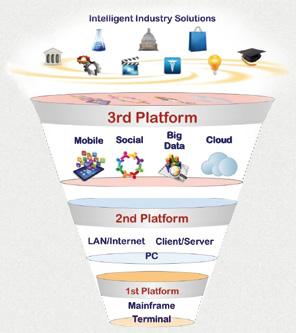IDC: Business is the new IT language
Interview with Johan Halberg, Research Manager, IDC
Analysis provider IDC focuses on IT consultants' business acumen when asked to describe their highlights for 2015. Technical knowledge of major trends must also be in place, yet the ability to describe business requirements is what will make the good consultants stand out from the pack.
An IT consultant must be able to deliver what customers demand. This may sound obvious and logical, yet it is a requirement that has accelerated in scope and significance in recent years, and will also affect consultants' everyday lives in 2015, according to Johan Hallberg, Research Manager at IDC Nordic.
"Before I came to IDC, I was a consultant for ten years – seven of them as a freelancer. So I'm well aware that this profession has always been about understanding your customers and delivering accordingly. When I nonetheless claim that it will be more important than ever for consultants to move closer to their customers' business, this is due to what we call the Third Platform," says Johan Hallberg.

IT equals business
The Third Platform is IDC's take on the technological development that the world has undergone. Mobility, cloud computing, social computing and Big Data have each fundamentally changed how we get and use IT. Yet these technologies also influence and reinforce each other, and together comprise a whole new technology platform for growth and innovation – as a third platform.
"Many companies still have legacy systems that are based on the Second Platform. For them, the Third Platform is an enormous change that they are still in the process of implementing in their business," says Johan Hallberg.
He explains how for the companies of tomorrow, IT and technology are no longer something to be hidden away. IT and technology are, quite simply, the actual business itself.
"We therefore predict that in the future IT consultants will be moving much closer to the actual business, since this is where their skills and knowledge are needed."
Change of mindset
The growing importance of IT in more and more companies' business models is, fundamentally, good news for consultants, since it confirms that there is a need for them. Yet it also requires an ability to seize the opportunities arising, when they arise.
"To put it bluntly, tomorrow's IT consultants can be divided into two categories. There are those who recognise that they can no longer sit alone, in a far corner of the office, but have to move into the management offices. And then there are those who are satisfied with what they know, and have no wish to develop. In my view, any consultant in the latter category is running a huge risk," says Johan Hallberg.
Would it be fair to say that for the consultants this is just as much about a change in mentality, as about technology?
"Definitely, and I can give you an example to illustrate the point. In Finland, for many years there was Nokia, at full speed ahead, and the paper industry. Fifteen years ago, everything was hunky-dory. But in 2014, Finland's GDP was actually negative, which was a disaster. Finland's largest companies were incapable of transforming themselves and changing course in time, and their entire society is still facing the consequences today," says Johan Hallberg.
"Finland has always been renowned for its excellent education system, but today it's part of the old world, since it hasn't kept up with the times. Returning to IT consultants, for them it's a question of understanding that they must drive their competences forward themselves, which can be tough going. I've been a consultant myself, and I know what it's like to work on a major project. You feel that you don't have time to attend a conference or read a textbook in your free time. All I can say is that it will be more and more important to develop, not just professionally, but also mentally. You must always be ready for change."
A whole new language
Johan Hallberg explains how for some people it can be difficult to abandon the classical idea of an IT consultant who ensures stable IT operation in return for being allowed to hide away in an IT department.
"This naturally also depends on which type of IT consultant you are. If you're a developer, it's obviously most important to stay updated on new technologies. But if you're a project manager, you must be able to work with new types of stakeholders, and also act in a new way. You can't say: 'I'm the project manager for all future implementations under the project, and this task will take me five months.' But you must say: 'Your company needs more capacity, to be able handle more customers.' You have to speak a whole new language: a business language," Johan Hallberg concludes.
Business apps (finally) taking off Johan Hallberg describes how the Nordic region is, at long last, beginning to see the B2B market implement new technology in day-to-day processes. For companies, this is especially a question of ensuring customers a good user experience on the mobile platforms, as well as increasing versatility and availability in the employee's digital toolbox.
"This development is closely related to the appearance of business apps that are directly connected to the companies' IT systems. We didn't think it would take so long to get these solutions developed and implemented in the Nordic region, but now we can see how this is finally taking off. This development will continue, picking up momentum in 2015, which may also be worth knowing for a consultant."